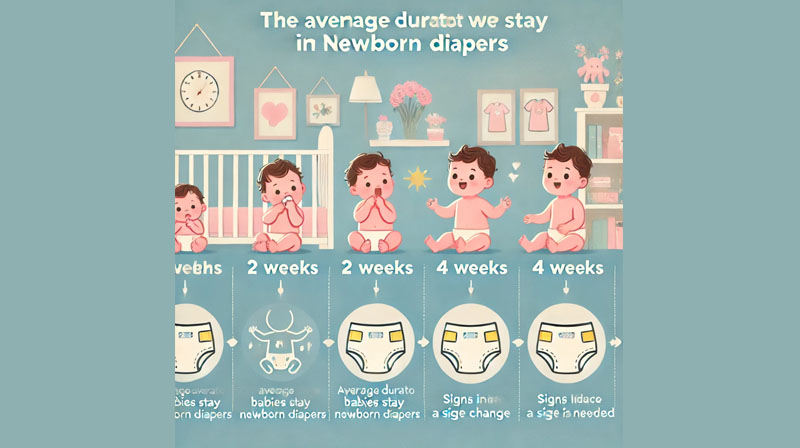How Long Are Babies in Newborn Diapers? A Comprehensive Guide
Welcoming a new baby into the world is an exciting and overwhelming experience for parents. Among the many considerations, diapering is one of the first challenges new parents face. One common question is: How long are babies in newborn diapers? This guide will provide a comprehensive overview, helping parents understand the factors that influence diaper size changes and offering tips for a smooth transition.

Understanding Newborn Diapers
Newborn Diapers: Features and Fit
Newborn diapers are specifically designed to fit the smallest and most delicate of infants. These diapers typically accommodate babies weighing up to 10 pounds (4.5 kg) and feature a snug fit to prevent leaks and provide comfort. Key features of newborn diapers include:
- Umbilical Cord Cutout: Many newborn diapers have a special cutout at the front to protect the healing umbilical cord stump.
- Soft Materials: The materials are often extra soft to avoid irritating the baby’s sensitive skin.
- High Absorbency: Despite their small size, newborn diapers are highly absorbent to manage frequent urination and bowel movements.
Factors Influencing Diaper Size Transition
Baby’s Growth Rate
The primary factor determining how long a baby will stay in newborn diapers is their growth rate. Babies grow rapidly in the first few weeks of life, and their weight can increase by 5-7 ounces (about 140-200 grams) per week. This fast growth means that babies can outgrow newborn diapers within a few weeks.
Birth Weight and Size
A baby’s birth weight and size play a crucial role in determining the duration of using newborn diapers. Babies born with higher birth weights (over 8 pounds or 3.6 kg) may outgrow newborn diapers more quickly, sometimes within the first week or two. Conversely, smaller babies or those born prematurely might stay in newborn diapers for a longer period.
Diaper Fit and Comfort
Parents should monitor the fit and comfort of the diapers. Signs that a baby has outgrown newborn diapers include:
- Leaks: Frequent leaks can indicate that the diaper is too small.
- Red Marks: Red marks on the baby’s skin, especially around the legs and waist, suggest that the diaper is too tight.
- Difficulty Fastening: If the diaper tabs no longer reach comfortably or the diaper seems overly snug, it’s time to size up.
Average Duration in Newborn Diapers
On average, most babies outgrow newborn diapers within 2 to 4 weeks. However, this can vary widely depending on the factors mentioned above. It’s important for parents to be prepared for this transition and have size 1 diapers ready for when the baby outgrows the newborn size.
Tips for Managing Diaper Size Transitions
Stocking Up Wisely
It can be tempting to stock up on newborn diapers before the baby arrives, but it’s wise to buy in moderation. Given the rapid growth of newborns, parents may find that they need to switch to size 1 diapers sooner than expected. A good approach is to purchase a small supply of newborn diapers and gradually buy more as needed.
Monitoring Growth
Regularly monitoring the baby’s weight and observing changes in their body can help parents anticipate when a size change is necessary. Pediatric visits are an excellent opportunity to track the baby’s growth and discuss any concerns with the healthcare provider.
Transition Gradually
When it’s time to transition from newborn to size 1 diapers, parents can do so gradually. Start by using size 1 diapers during the day while continuing with newborn diapers at night. This allows the baby to adjust to the new size and helps parents determine if the new size is a better fit.
Donating Unused Diapers
If parents find themselves with unopened packs of newborn diapers that their baby has outgrown, donating them to local shelters, hospitals, or diaper banks is a great option. This helps families in need and ensures that the diapers are put to good use.
Choosing the Right Diaper Brand
Fit and Comfort
Different diaper brands can fit differently, even within the same size range. Parents may need to try a few brands to find the best fit for their baby. Comfort is key, so choosing diapers made from soft, breathable materials is essential.
Absorbency and Leak Protection
Newborns urinate frequently and have frequent bowel movements, so high absorbency and effective leak protection are crucial. Parents should look for diapers with good reviews for absorbency and leak prevention.
Eco-Friendly Options
For environmentally conscious parents, there are eco-friendly diaper options made from sustainable materials and designed to minimize environmental impact. These diapers can be a bit more expensive but are worth considering for those looking to reduce their environmental footprint.
Conclusion
The duration that a baby will spend in newborn diapers varies depending on factors like growth rate, birth weight, and overall fit. On average, most babies outgrow newborn diapers within 2 to 4 weeks. Parents should be prepared for this transition by stocking up wisely, monitoring their baby’s growth, and gradually transitioning to the next size.


